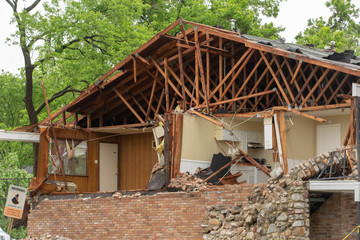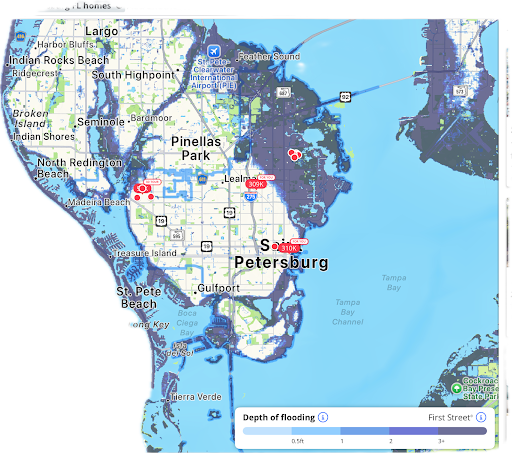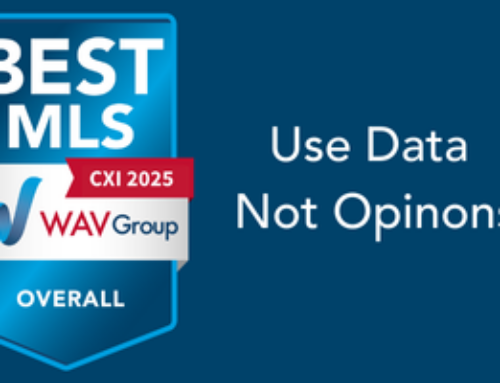 Was Your Home Impacted?
Was Your Home Impacted?
Did you have damage from the Hurricanes? As the snowbirds and spring break crowd hit Florida to reconnect with year-round residents, hurricane damage is the hot conversational topic. Of course, the majority of homes for sale were either just remodeled or needed to be remodeled. It’s an important time for Realtors.
On the west coast of Florida which suffered through hurricanes Helene and Milton in 2024, climate damage is one of the first topics that is discussed when you meet someone. The devastation is mostly cleaned up, but the repairs linger and many homes are being torn down. If a home suffered damage of more than 50% of its value, it must be a teardown. The word on the street is that 42,000 homes might be removed by the time FEMA packs up.
If climate risk is important to home buyers, real estate websites have much catching up to do.
According to a Redfin-commissioned survey conducted by Ipsos late 2024, 56% of Millennials and 50% of Gen Z say climate change directly influences where they choose to live. That number drops significantly for older generations – just 31% of Boomers and 40% of Gen X reported the same concern.
Here in Pinellas County, Florida, which is located on the west side of Tampa, I can tell you that 100% of buyers are focused on climate risk.
Despite the growing demand for climate-related transparency, brokerage websites still lag in delivering this type of data that today’s buyers want. While some platforms have started offering basic flood-risk indicators, very few provide climate impact data down to the property level. Even more surprisingly, there’s virtually no access to a home’s actual climate damage history – not from national portals, not from local broker sites.
Why does climate data matter in real estate search?
This isn’t just a theoretical issue. Redfin’s earlier study from 2022 found that when homebuyers had access to flood-risk data, they consistently placed offers on properties in lower-risk zones. The implication is clear: access to environmental risk data doesn’t just inform – it changes behavior.
Buyers are asking more intelligent questions about their homes: Is this area prone to wildfire? Has this home sustained flood damage? Will the insurance premiums balloon over the next five years due to rising storm risks? These questions deserve answers during the home search, not after move-in.
Brokerages have a window to win – but it’s closing
Portals and proptech startups are already circling this space. If broker websites don’t add climate risk data soon, they’ll lose another opportunity to layer value in the consumer journey with their brand. It’s not just about being first to market, it’s about staying relevant to a new generation of buyers who don’t separate climate concerns from housing choices.
The good news is that parcel-level and historical climate data are becoming more accessible through new data partnerships. Cotality (Formerly CoreLogic) is a leader in climate data licensing for broker websites. Brokerages should consider integrating that intelligence into their search experiences before consumer expectations move on without them. Premium Flood Map and Hazard & Risk Reports are currently available in Realist. These tools are already widely used by over a million agents and can be a valuable resource. Agents have the ability to purchase these reports directly within the Realist platform, offering a convenient way to access detailed property insights without needing additional tools. This information can support more informed conversations with clients and enhance overall decision-making.
The predominant vendor used by Zillow and other portals is First Street. The map below depicts the flood damage from last year’s hurricanes on Zillow.com.
We have found in our tests of First Street data that it is pretty good in general, but less informative on individual household climate risk. There are cases where homes on the same block may have greater or lesser climate risk than the house next door.

Realtors® are already on top of this. Realist reports from Cotality and Realtors Property Resource® (RPR) are on the kitchen counter at most open houses here. Still, those are only available from your Realtor through the MLS or REALTOR® Association – an opaque process, but not necessarily a bad one.
As a lead generator, you can put a call to action on your website to request a climate report on individual listings. However, the best practice is to include climate data on the individual listing detail page.
Requiring registration to access climate data is another great lead generation option if you pay off the registration effort by displaying the data.
It’s time for brokers to step up their game on their consumer-facing websites and make climate data transparent for home buyers. Don’t go it alone. Get help from WAV Group to develop your climate risk strategy, and allow us to help negotiate data licensing for climate data.
Zillow uses First Street data, but there are better sources. We can help you find the right solution for the right price, and the strategy may include companies like zavvie that work with brokers on cash purchase programs or HouseAmp that fund pre-sale home improvement financing.
A great strategy will often have multiple attributes to create a system of information and assurance solutions. Contact us using the form below and either David Gumpper – Primary Lead of WAV Group Technology or WAV Group co-founder, Victor Lund will be happy to help.




